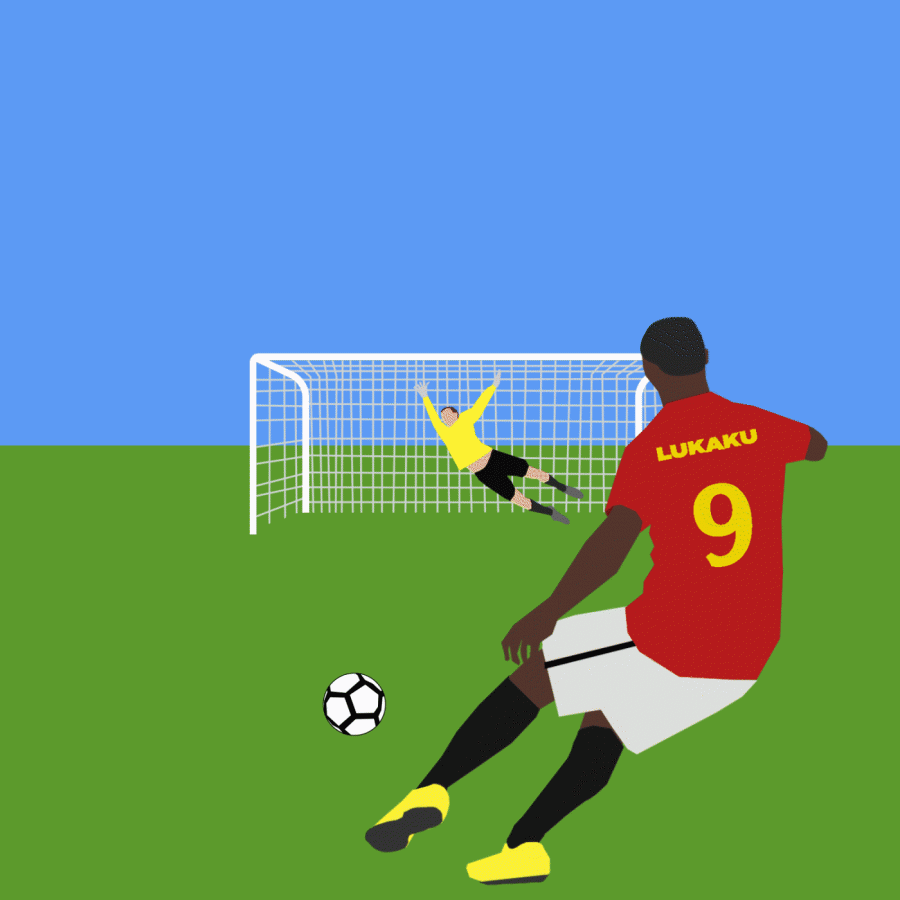The Best Football Isn’t American
July 31, 2020
Growing up, I would watch Navy and Ravens football with my dad and occasionally head into Baltimore with my mom to catch an Orioles game. While I consider any sport fun to watch live, I could never get as into watching sports on television as my father and friends did — even ice hockey, the sport I loved playing so much. Every week, I would spend hours on the ice at practice, but was always left out of the locker room NHL talks as I could seldom get myself to watch an entire Capitals game. American sports have so many commercials and, besides the ad breaks, a general stop-and-start nature to them. Despite the average NFL game lasting over three hours, the ball is in motion for a mere 11 minutes!
Right when I accepted that watching sports just wasn’t for me and I would never enjoy it as much as my father or friends, I traveled to Europe. My best friends and I visited Belgium right before the start of the 2018 World Cup. Outside our hostel in Antwerp, a bar had set up multiple televisions and hundreds of chairs for a pre-tournament friendly — the soccer equivalent of an organized scrimmage — between the Belgian Red Devils and Egypt’s national team. My friends and I decided to order some beers and watch the game, and we immediately got swept up in the passion. Despite the game essentially meaning nothing, the fans were more into it than any U.S. sports fan I had ever seen. When Antwerp local Romelu Lukaku scored at the end of the first half, the Belgian fans went so crazy that you’d have thought they just put a man on the moon.
When I got back to the U.S., I watched every game of the World Cup that I could and completely fell in love with the sport. Following the tournament, I adopted Manchester United (partly because that’s the club that Romelu Lukaku was at the time), and since then my love and appreciation for the sport as a whole has only grown. Learning about the history of the sport, watching the different styles that are played across the world, following the drama of the politics of soccer — it’s all just so engrossing.
As American sports leagues struggle to make plans to safely return or struggle to implement any plans for the future, European soccer has been back for weeks now. Only the French Ligue 1 and Dutch Eredivisie were forced to end their season early by their respective governments. Every other major national league in Europe has returned and the Champions and Europa leagues will also make their return this August.
With all that being said, now I’m going to try to convince the American sports fan to give the most popular sport on the planet a chance.
Uninterrupted Gameplay
As I mentioned before, American sports have so many commercials! The average NFL game has 63 minutes of commercials and the average NBA game has 45 minutes. That doesn’t include all the time when the ball is dead or out of bounds, team timeouts, video reviews and all the other ways the game is slowed down. I feel like I’m watching commercials interspersed with players walking around. The most annoying is when they return from four minutes of commercials for the kickoff, just to cut to another commercial break.
Soccer is completely different. The game is played in two 45-minute halves with zero — I repeat, zero — commercial breaks during the halves. The only commercials for the entire game come during the 15- to 20-minute halftime. While there is still some stopping for balls hit out of bounds, free kicks, injuries and video reviews, that time lost is then tacked onto the end of each half so you end up with a true 90 minutes of action every game.
Promotion and Relegation
Amercians sports leagues operate with a closed league system. This means that every single year the same teams play in the league and the only way for a new team to make it in is to enter as an expansion franchise. For the most part, the good teams stay at the top and the bad teams stay at the bottom. The only way to break the system is to hope you get lucky and draft a generational talent who can turn your franchise around.
Unlike American sports, where teams will often intentionally lose games to secure better draft picks, soccer teams will never throw.
Most soccer leagues around the world are not closed leagues. For example, England has eight tiers of league football and many other tiers of non-league football. Below that are hundreds of clubs all trying to make it to the top tier, the Premier League. At the end of every season, the top three teams from one league are promoted to the league above and the bottom three teams are relegated to the league below.
This means that every season the league has a different set of teams and competition always stays strong as teams are constantly vying for the right to play in a top league. Unlike American sports, where teams will often intentionally lose games to secure better draft picks, soccer teams will never throw, as it can be detrimental to their clubs.
Even in the top leagues, teams have to fight to earn positions at the head of the table to qualify for international competitions. In Europe, the top teams from each league compete in the Champions and Europa leagues, and in South America, the top teams compete for the coveted Copa Libertadores. Even if you can’t win your league, it is still worth it to try and fight for a top spot, as qualifying for one of those competitions brings in more TV revenue and makes your club more attractive to players looking to transfer. This brings me to my next point.
Multiple Competitions
The New England Patriots only want to win the Super Bowl every year. The LA Lakers only want to win the NBA Finals. The Yankees only want to win the World Series, and the Colorado Avalanche, you guessed it, only want to win the Stanley Cup. Besides the fact that those are the most prestigious awards for each league, they are the only reward that every team can chase within their sport.
Soccer clubs compete for a number of different trophies every year. A team like Bayern Munich or Real Madrid will simultaneously be competing to win their respective national league, additional national cup competitions like the Copa del Ray and DFB Pokal, and the Champions League trophy. Despite the fact that Manchester United have lost out on the Premier League trophy to Liverpool, United can’t slow down because they are still in contention for the FA Cup and Europa League Final.
Between the club football seasons, every summer the players return to their national teams to compete for international trophies in events like the Olympics, Euros, CONCACAF Gold Cup and, the most prestigious football tournament of all, the World Cup. Throughout the club seasons, there are multiple breaks to allow players to train with their national teams to ensure there is some team chemistry built for those competitions.
Diversity
Soccer is the most played and watched sport internationally. This creates an incredible diversity in both the nationality of players as well as the styles of the game played.
Soccer teams are made up of players from just about every corner of the world. The Tottenham Hotspurs may be from London, but Hugo Lloris is from France, Serge Aurier is from Côte D’Ivoire, Son Heung-Min is from South Korea and Lucas Moura is from Brazil, and those are just a few examples.
As soccer is based on a number of similar sports that independently developed across the world, there is an extremely interesting array of styles of play based on different countries. Italians value a rigid defense, while the English focus on speedy counterattacks based on long passes from the back. Spanish teams work with short passes to slowly move the ball up the field, and the Dutch’s brand of “Total Football” is about generating and utilizing space to create chances. Despite the effects of globalization, a game from the German Bundesliga still looks entirely different than one from the Spanish La Liga.
Final Points
I could go on and on about the reasons why I love soccer, but I’ll end by addressing some of the biggest complaints that I hear from American sports fans about soccer: the clock counts up, games can end in a tie, there’s not physicality and, most notably, the flopping.
First, the clock counting up. The clock counts up so that additional time can be added to the end of each half to make up for stoppage time throughout the halves. If you know how much time is in a half, 45 minutes, and the referees tell you how much stoppage time there is, why is the fact that it counts up even a big deal? Americans like to act like it is wrong, but I hate to break it to you: The English set rules to soccer way before the Americans ever set rules to our sports, so if anyone is wrong, it is us.
Next is the fact that games can end in a tie, or, as they call it in soccer, a draw. Most soccer leagues do not have playoffs, and, instead, the team with the most points at the end of a season wins the title. Teams get three points for a win, one point for a draw and no points for losing. Unlike American sports where the entire season is only valuable for postseason seeding, every game in soccer matters immensely to the clubs.
The English set rules to soccer way before the Americans ever set rules to our sports, so if anyone is wrong, it is us.
In knock-out competitions like the World Cup or Champions League, where games cannot end in a draw, they do have overtime rules. Games will either go into a penalty shootout, golden goal where the first team to score wins or, most commonly, two additional halves of 15 minutes each.
The idea that there is no physicality in soccer is just absurd and only spread by people who’ve clearly never watched a game before. Soccer players run around 7 miles every game and clash in aerial battles for headers and slam into each other for tackles. Obviously, there isn’t as much slamming as American football or ice hockey, but soccer players are world-class athletes putting their bodies through hell every game just like any other athletes.
Finally, the flopping. Flopping, or diving, is when a player will dramatically throw themselves to the ground to try and draw a foul or penalty. I will admit, the flopping is annoying and unfortunately part of the game to some degree. Rules against it have cut the practice down somewhat, but you will still see some every game. While it may not be as common, if you think that there is no flopping in the average American football or basketball game, then you are lying to yourself. I should add that until you actually watch the sport, you will think there is more flopping than there actually is. While it may look like a dive in real time, when slowed down, it is easy to see that one foot across your ankle when you’re barreling down the field with a ball at your feet can easily throw you off.
I hope that I have convinced you to at least check out some soccer, if not only for the fact that it is on and going at full force. Even when the NBA is back, many of the best players will be sitting out, making the rest of the season a shell of what it should be. In contrast, all the stars that you know, probably only Ronaldo and Messi, and the stars you don’t yet are playing at the highest level as we speak. Finally, one last thing: Glory Glory Man United!
















Vouretta • Oct 27, 2022 at 5:20 am
Finally I’ve found someone hu agrees with me for me american football is just the replica of rugby n I was made to understand that rugby came out from soccer or English football which was originally called football. Where I’m from football is passion it is life.
My favourite club is Chelsea nicknamed the blues like the editor said before no commercials n complete 90minutes of live actions